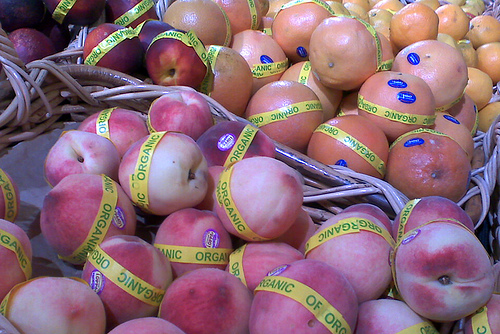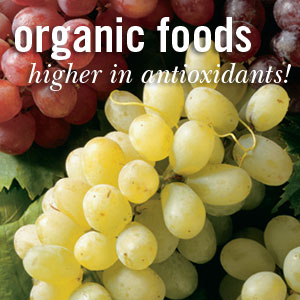Organic Foods Unhealthy and Bad for Environment
The other night Penn & Teller: Bull! aired a new episode discussing Organic Foods and interviewed several scientists as well as organic food activists in order to determine whether organic foods were actually healthy or not. Some interesting facts came about and all the arguments for organic foods were suddenly debunked.
toc_collapse=0;
Contents
Contents
The LA Times also reported on Organic foods as well supporting Penn & Teller's conclusions.
Good For The Environment
Organic food supporters kept discussing how organic food is better for the environment, with less toxins being absorbed by the soil and little to no preservatives or pesticides.
Turns out, pesticides and preservatives are used in organic food. In fact, in order to not use "synthetic" pesticides (which the American cancer society has found no link to a cause of cancer and pesticides) these organic companies have to use more poisonous and even more deadlier pesticides that damage the environment.
The amount of land used to grow organic foods actually means that more trees are cut down and more green land needs to be destroyed.
If all farmers in the world went organic, there would be 3 billion people starving (and many more who cannot afford it). Price of food would skyrocket, that can lead to war--so stop eating organic food and support world peace!
Better Taste
The Penn & Teller: BS episode tried various blind taste tests, and it seems like the non-organic foods actually taste better most of the time and no one can tell the difference either.

The idea of organic tasting better seems only to be psychological in nature.
Healthier
Organic food is frequently claimed to be healthier. Due to more poisonous pesticides being used, it's probably not.

The LA times article as well as Penn & Teller both conclude that there are no extra nutrients in organic food. The article also concludes that there are very little differences in terms of the growing of organic foods (only in pesticide).
Naturalists
Lately, we've heard from many people who are under this growing belief that cancer rates are skyrocketting--that diseases are caused by chemicals in our foods--or that unnatural or chemical-based products are bad for you.
This fear is generated by a lack of knowledge of chemistry, biology, and a lack of attention to scientific journals and constant bad news that is spread by the media (because bad news generates more viewers).
Don't get started on genetically enhanced food, that scares everyone. Even though most genetic engineers will tell you how harmless it is and how well researched everything is (one even compared it to cooking).
Of course, that doesn't mean go and buy all the artificial products and supplements in the world (chances are, you don't need them).
However, it would be good for you to know that, since the 1950s, cancer rates have dropped in all categories (whether that's because of treatments or reduced causes of cancer, we may not know for certain). The reason we hear bigger numbers for cancer deaths are because of population increases.
Now here is a comment left in the comment section by someone, I thought it was well written and good thoughts on the matter.
First of all, the environmental impact of organic farming is less than that of conventional farming, because organic farming practices actually maintain carbon levels in the soil, thus creating more sustainability during weather changes, droughts, etc.
Second, the yield for organic farming may be worse for some particular crops (like potatoes for example), but is actually comparable or better in some cases for other crops like (meaning the same amount of land needed -- no more trees cut down than conventional farming). Given this information, on top of that, the impact on the eco-system surrounding organic farms is lessened and it has been shown that the diversity of wildlife is higher in areas where organic farming is implemented.
Synthetic pesticides that are used on conventional farms have been shown to kill animals, reduce reproductive capabilities, and has been shown to harm some people that eat the food. Also, the Soil Association's guidelines for organic farmers only allow them to use 4 types of pesticides--where conventional farmers use over 300 different types. Of the four types that organic farmers can use, they are composed of materials like softsoap or rotenone (natural origin), or simple chemical products containing copper and sulfur (which break down naturally with sunlight minimizing any environmental effect). As for the copper compounds, the copper is already naturally occurring in the soil, and most conventional farmers actually have to manually add copper to the soil to correct for their copper deficiencies (because their soil is nutrient deficient). I'd love to see the references that Pen and Teller have for their claim that organic farmers use much more deadly pesticides, because the research out there just doesn't support that claim. It is true that organic potato farmers and organic orchard farmers use pesticide spray more than conventional farmers (in many cases)--but in terms of overall farming, organic farmers spray only 2-3% of their crops.
As for the nutritional benefits of organic food versus conventional, number one the animals that eat organic feed are healthier overall as their diet is closer to what they naturally eat anyways, and contain less deadly pesticides. Due to higher overall health of the animals, there is no need for routine use of antibiotics, so the residue that is often found in conventional farmed meats isn't a problem in organic farmed meat. In terms of nutrients in the food that we eat, many studies have shown that organic food is higher in antioxidants, flavinoids, and other vitamins. Organic produced milk is higher in healthy Omega-3 fatty acids, Vitamin E, and Vitamin A, than non-organic milk. Organic standards also prohibit a huge list of additives that are present in non-organic food reducing food allergies and many adverse health effects.
The United Nations Food & Agriculture Organization (FAO) actually agrees that organic farming will help meet the needs that global food needs require, better than conventional farming for numerous reasons including sustainability, less resources needed, less irrigation needed due to better water retention in the soil, etc. I think the evidence speaks for itself. The Pen and Teller conclusion was based on false pretenses and cherry-picked research if anything. They should have looked at global evidence and overall research if they weren't so concerned with their own personal agenda.
-Lagius
English Vintner

No comments:
Post a Comment